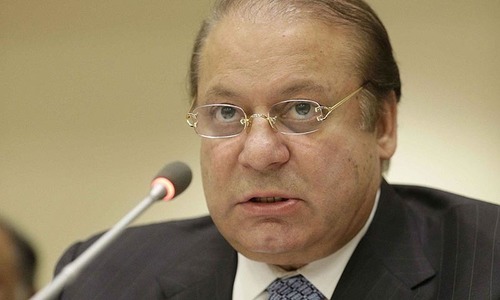THE business community is hoping for a better deal in the budget 2016-17, but will the expected fiscal measures be able to mobilise the local investors in a big way? Industry and business leaders doubt it.
They see incremental economic growth in the year ahead but rule out a sharp increase in the rate.
They believe that the government has neither the intention nor the capability to reorient Pakistan’s state structure that, they say, is ‘obstructive, unpredictable, centralised, corrupt and ineffective’.
They are particularly upset by the way the Federal Board of Revenue turns to them for meeting revenue shortfalls and forces them to foot the bill of flawed taxation regime and its enforcement machinery. They resented proposed extension of the super tax and the tax on undistributed reserves that were introduced as a one-time measure in the last budget to cope with the cost of settling internally-displaced people.
The economic hierarchy of the government, however, insists that the growth objective is guiding the policy decisions now and the next budget will hold testimony to this vision of development, which is inconceivable without the participation of the private sector. “We are targeting around 6pc growth by the end of FY17 and push it to over 7pc in the election year 2018,” Finance Minister Ishaq Dar told Dawn recently.
The relative optimism of the business leaders was based on the frequency, taste and tenor of multiple pre-budget government meetings with the private sector. Several trade bodies did submit their budget demands (wish lists). Besides articulating their specific interests a common theme runs through their spaghetti bowl of proposals.
The private sector wants the government to clear whatever it owes to it (tax refunds, etc), action on dumping of imported goods impacting adversely the market base of local products; renegotiation of the hurtful free trade agreements and end to harassment of corporate taxpayers.
Talking to Dawn over the phone from Islamabad, Special Assistant to Prime Minister on Revenue Haroon Akhtar said that the upcoming budget will pleasantly surprise the private sector that he found to be enthused by the government’s economic performance.
“I have not witnessed any negativity in about 50 odd meetings on budget where businesses were represented. I am a businessman myself and well understand the challenging environment that they work in. I can tell you that the budget 2016-17 will be business-friendly”, he said.
“We have expanded the qualification criteria for tax credit to include BMR to new investment and cover 50pc private equity in new investment. We have also proposed to extend the tax credit schemes terminating on June 30 2016 for another four years to 2020,” he elaborated while disclosing details of the budget proposals at the finalisation stages in the ministry of finance.
He said the government will further reduce the corporate tax by 1pc as promised from 32 to 31pc.
He also mentioned revenue constraints and demands on the limited fiscal space that pose limits on the government’s ambitions to deliver quickly and efficiently. He admitted that the tax collection machinery needs to be overhauled for better performance. “I can assure that the government is at it as improvement in revenue collection shows but the challenge is monumental and streamlining of the system will take time”, he said.
Shaukat Tarin, a former finance minister, gave a more nuanced view of the economy. “I do not expect anything radical in the next budget. It is good that the revenue collection has improved but with repayment of loan when commodity and oil prices are moving up is not going to be easy for the government. The over-centralisation of economic decision-making retards the process. The tendency of the FBR to shift the responsibility of revenue collection and documentation to banks and companies seem to be backfiring. Just look at the bank withdrawal numbers”, he remarked.
“I do expect incremental growth in GDP owing to the CPEC related investment, but the rate might be slower than projected by Mr Dar,” he added.
Ehsan Malik, CEO Pakistan Business Council, sounded sceptical. “My sense from the interaction in Islamabad is that the government is not aiming for anything drastic. They did give assurance to act on some minor demands relating to tax credit schemes but did not seem inclined to move decisively on factors hurting the business sentiments translating in low investment,” he said.
He was critical of the government not doing enough to clamp down on illegal circulation of cheap foreign products pushing local industry out of business. He gave example of fan industry that has perpetually been struggling and losing market to duty-free imports.
“I think the government is constrained by its institutional resources and the policy set actually retards the scope of capital formation,” he commented.
Federation of Pakistan Chamber of Commerce and Industry President Abdul Rauf Alam says that the private sector has been engaged by the government this time in the budget-making process. He criticised his own constituency for sometimes forwarding unrealistic demands such as reducing sales tax to single digits.
“I think abrupt changes in policies hurt business sentiments more than anything else. The private sector must also transform to respond to the changing market needs instead of demanding protection from the government,” he stated.
Published in Dawn, Business & Finance weekly, May 16th, 2016













































